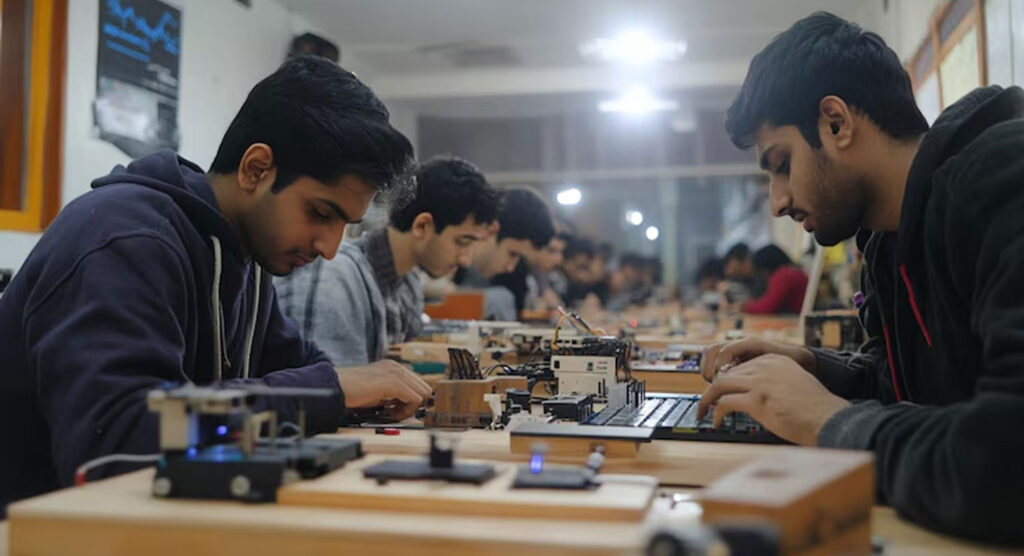Dr. Alka Kapur, Principal, Modern Public School, Shalimar Bagh
Skills are the currency of the future; the more you invest in them, the more valuable you become.
In a world where technology is evolving faster than ever before, education must adapt to empower learners not just with knowledge, but with the skills to maneuver and endure real-world challenges successfully. This is where Technical and Vocational Education and Training (TVET) plays a transformative and decisive role. TVET implies an educational framework that imparts technical knowhow and practical skills eminent for careers across various sectors viz a viz specific trade, crafts etc. The purpose is to foster employability, encourage entrepreneurship, and enable individuals setting an aim for self sustenance and become one of the contributors to the economy.
The pertinence of TVET has grown in quick succession in the context of today’s global economy, which is quite evident by faster technological advancements and a broadening skills gap. Across the World, nations are investing in vocational training to meet the soaring demand for a skilled workforce. In India, the situation is particularly critical. As of recent data from various sources, including the Ministry of Skill Development and Entrepreneurship (MSDE) and international reports such as those from the International Labour Organization (ILO); India has only around 4-5% of the workforce that has received formal vocational training, which is much lower than in many developed countries like Germany, The United States etc. This disparity between academic education and industry needs highlights the exigency of integrating TVET into mainstream education. It is for this reason that the Hon’ble Prime Minister of India Shri Narendra Modi has emphasized the importance of creating a “pipeline of talent” to maintain growth momentum, pressing the need for robust education and skilling systems to meet evolving demands at global level.
Recognizing this imperative, the National Education Policy (NEP) 2020 has paved the way to ingrain vocational education from the middle school level, ensuring that the learners are introduced early to skills that prepare them for real-life applications. By education, I mean an all-round drawing out of the best in the child—in body, mind and spirit’. Strictly aligned with this powerful adage of Mahatma Gandhi, Modern Public School, Shalimar Bagh, has been a proactive pioneer in this direction. The school has redefined learning by integrating skill development and vocational training into its curriculum, well before it became a national priority. At Modern Public School, education is not restricted to the four walls of a classroom. The school offers a wide range of skill-based modules—from Artificial Intelligence and coding to culinary arts, 3D printing, digital marketing, and sustainable living. Its Atal Tinkering Lab fosters innovation and problem-solving through hands-on learning, where students are motivated to design, create, and prototype. A significant breakthrough in this journey is the recognition received by the School by NITI Aayog and the Atal Innovation Mission as a Showcase School for Innovation, highlighting the school’s dedication to fostering creativity and innovation. As part of this honor, the school hosted former NASA astronaut Mr. Mike Massimino at its Atal Tinkering Lab, inspiring students to explore new frontiers in science and technology. This recognition and event further amplify curiosity, empowering students to innovate and confidently embrace the future.
Beyond technical skills, the school places equal emphasis on soft skills such as communication, teamwork, emotional intelligence, and adaptability, the core competencies that are non-negotiable in today’s collaborative work environment. Through regular industry interactions, guest lectures, workshops, and internship opportunities, students are provided real-time exposure to professional scenarios, helping them align their classroom learning with global expectations. The school also aligns its efforts with national missions such as Skill India and Startup India, encouraging students to develop an entrepreneurial mindset and become job creators of tomorrow.
“Skill is the unified force of experience, intellect, and passion in their operation.” – John Ruskin. As we stand at the cusp of the Fourth Industrial Revolution, it is clear that the future belongs to those who are agile, adaptable, and skilled. TVET holds the promise of a workforce that is not only capable but also future-ready to embark on a journey of discovery, innovation, and application.



